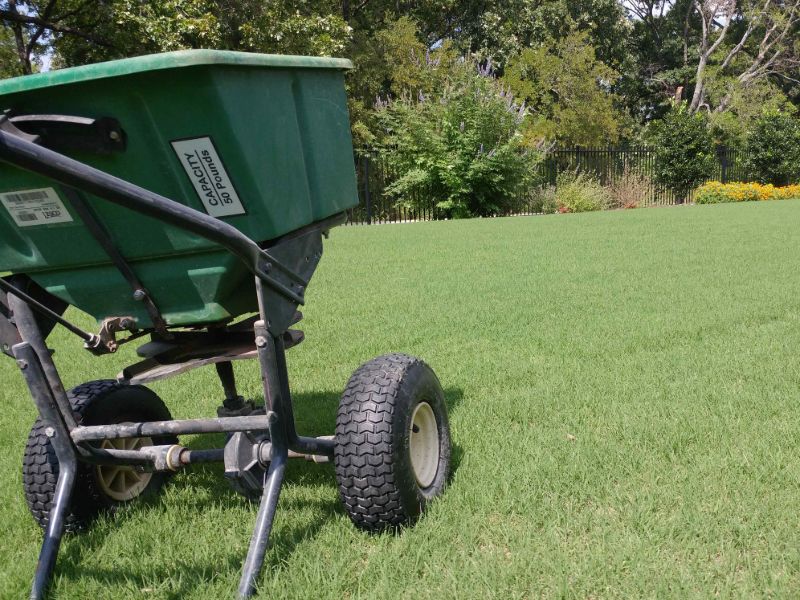Lawn Fertilizer Service
A North Texas Lawn Maintenance Necessity
A beautiful green, luscious lawn can be the envy of your neighborhood in North Texas. It not only enhances curb appeal, but it helps show pride of ownership and care for your family. However, maintaining a weed-free lawn can be a challenge in the warm, humid climate of the Dallas area. That’s why American Lawnscape uses golf course grade fertilizer products designed for your lawn’s specific need. Call or Text us for a complete customized lawn maintenance program for your yard 214-308-1322.
What is The Best Fertilizer To Use in Texas?
Texas is larger than many European countries. We have a wide range of climates, elevations, and soil quality that all dictate specific needs and requirements from a fertilizer program. Generally speaking, though, you can choose your fertilizer products by whether you are starting a new lawn or feeding an established lawn. If you are feeding an established lawn, the time of year of your application will dictate product details and treatment strategy. The needs of your turf differ from season to season.
What Is The Best Fertilizer To Use In Spring In Texas
For most applications, a granular fertilizer with a high nitrogen content (like a 28-3-10) containing a variety of micronutrients should be applied in early spring right about the time that your turf is coming out of its seasonal slumber. A combination of quick and slow-release nutrients are beneficial for both short term and extended term plant health. A product containing both will allow the grass to green up right away and have a “drip” of nutrients for the grass to draw from over the next couple of months.
One of the ongoing struggles in arid and/or over-farmed regions (that eventually become our lawns) is that our soil isn’t soil at all . . . it’s dead, non-organic clay and rock. Due to our lack of quality soil, one micronutrient that is critically needed in springtime fertilizer applications (especially in North or West Texas) is sulfur.
Like our own gut microbiome, our turf needs active microorganisms to help it predigest nutrients for absorption. Micronutrients are also responsible for breaking down organic lawn debris such as grass clippings, leaves, bugs and all else. A strong contingent of microorganisms keeps the nutrients flowing to the grass plant and fosters decomposition of organic lawn debris.
Not all areas in Texas require sulfur fertilization, though – at least not continually. There are many areas throughout Texas like in Hill Country or in southern areas like Houston that have actual biologically active topsoil.
If you have less than 1” of organic topsoil before your lawn becomes clay, periodic sulfur applications will assist in invigorating your lawns microflora; resulting in a healthier lawn that can clear itself of organic waste debris. Debris becomes your new topsoil once decomposed.
What Is The Best Fertilizer To Use In Summer In Texas
Summertime in Texas can produce some brutal weather conditions for our turfgrass to struggle through. High temperatures combined with drought conditions and watering restrictions leave our lawns vulnerable to harsh climates as well as potential pest infestation if turf is not strengthened ahead of time.
A good summertime fertilizer for Texas lawns can be very similar to what we use in the spring. Higher nitrogen fertilizers are beneficial for lawns that are primarily clay due to the lack of surface permeability. As the temperatures outside rise, our ground becomes more compact. This makes it very difficult to get nutrients where they are needed, the grass root system. There is a balance to be aware of though, overfertilizing your turf can produce as many negative results as not fertilizing at all.
The goal of a solid summertime fertilizer program in Texas should focus on yield rather than pounds of nitrogen on the ground. If your lawn is very compacted and it’s too late in the season to core aerate, a spoon-feeding approach may be necessary. This is where you would put half rates of granular fertilizer down every few weeks rather than a full rate all at once.
Another fertilizing method you can employ when your soil is compacted is to apply liquid fertilizer instead of granular. Although there are no slow-release benefits to liquid fertilizers, they do have the ability to be absorbed through the grass blades rather than the roots. In situations where the ground is impermeable, this option allows for quick release nutrient uptake.
Liquid fertilizers applied to your lawn in the summer should be administered in the early morning or late evening to avoid applications during the heat of the day as this may damage already stressed summer turf.
What Is The Best Fertilizer To Use In Summer In Texas
Summertime in Texas can produce some brutal weather conditions for our turfgrass to struggle through. High temperatures combined with drought conditions and watering restrictions leave our lawns vulnerable to harsh climates as well as potential pest infestation if turf is not strengthened ahead of time.
A good summertime fertilizer for Texas lawns can be very similar to what we use in the spring. Higher nitrogen fertilizers are beneficial for lawns that are primarily clay due to the lack of surface permeability. As the temperatures outside rise, our ground becomes more compact. This makes it very difficult to get nutrients where they are needed, the grass root system. There is a balance to be aware of though, overfertilizing your turf can produce as many negative results as not fertilizing at all.
The goal of a solid summertime fertilizer program in Texas should focus on yield rather than pounds of nitrogen on the ground. If your lawn is very compacted and it’s too late in the season to core aerate, a spoon-feeding approach may be necessary. This is where you would put half rates of granular fertilizer down every few weeks rather than a full rate all at once.
Another fertilizing method you can employ when your soil is compacted is to apply liquid fertilizer instead of granular. Although there are no slow-release benefits to liquid fertilizers, they do have the ability to be absorbed through the grass blades rather than the roots. In situations where the ground is impermeable, this option allows for quick release nutrient uptake.
Liquid fertilizers applied to your lawn in the summer should be administered in the early morning or late evening to avoid applications during the heat of the day as this may damage already stressed summer turf.
What Is The Best Fertilizer To Use In Fall In Texas
At the end of a hot, dry Texas summer your turf grass is feeling like they just went 12 rounds with the champ. The turf is beat up, sun burnt and probably dehydrated. Part of your recovery plan should involve some high quality turf nutrition with micronutrients in the fall. You can dial back the nitrogen portion a bit, the growing season is about over. Make sure the product you choose has plenty of potash (potassium) and magnesium. These will help bolster the root system before winter.
What Is The Best Fertilizer For New Lawns In Texas
For new lawns whether they be from sod or seed, the same general fertilizer guidelines listed above apply with a few exceptions.
Granular fertilizers specifically labeled as starter fertilizers should be the first fertilizer used on your new turf grass. The starter fertilizer formulations differ in that they usually contain higher amounts of phosphorus (the middle number on the bag). Phosphorus plays a critical role in many plant functions including rapid root system development and photosynthesis.
Higher phosphorus fertilizers should be used as start-up fertilizers only. Excessive phosphorus run-off has been linked to death in aquatic life and is potentially harmful to the environment in other ways when misused.

